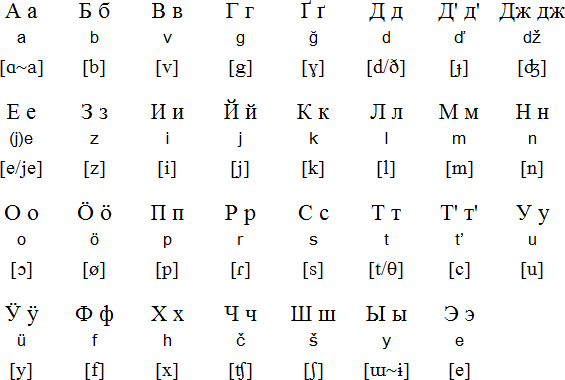Urum is a Turkic language spoken by about 185,000 people in Ukraine. Urum belongs to the Kypchak branch of the Turkic language family and is spoken in the Donetsk region of southeastern Ukraine, and in the Gori area of the Shida Karti region in central Georgia. It is considered by some a variety of Crimean Tatar.
The name of the language comes from the word Rûm (Rome), which was the name used in the Muslim world for the Byzantine empire, and it was also used in the Ottoman Empire for non-Muslims.
Urum has been written with the Greek alphabet, and between 1927 and 1937 it was written with a version of the Latin alphabet known as the New Turkic Alphabet, and it was taught is some schools. After 1937 it was not used in writing. A primer in Urum published in 2008 uses the version of the Cyrillic alphabet shown below.

Download an alphabet chart for Urum (Excel)
Download an Urum alphabet chart provided by Wolfram Siegel (Word doc, in German)
Bizım halh gäldi kavkaza vasemnadsati vektya. gäldıh, šindi onida diyamäm točnii sočiya yadä suhuma, pamoemu suhuma gäldıxh. Suhumda, soram general passkeevič gätırdi tzalgaya. gäldılär tsalkada, bahtılär burda varıdi, čay, göl. Dedılär ki burda uje yaša-mah olur, burda ävläri yapah, göl oradä, čay oradä, yapah yapıläri da yašiyah elädändä ištem gäldılär beštaša.
Our people came to the Caucasus in the eighteenth century. We came, but I couldn't say where exactly we came to Sukhumi or Sochi, probably we came to Sukhumi. In Sukhumi, then General Paskevich brought them in Tsalka. They came to Tsalka and saw that there is river and lake here. They said that it's already possible to live here, it is possible to build houses. Lake is there, river is there, let's build houses and let's live. That's how they came to Beshtasheni.
Sample text provided by Jin Wei Hii
Source: Caucasian Urums and Urum language by Stavros Skopeteas
Information about Urum | Numbers
Information about the Urum language
http://en.wikipedia.org/wiki/Urum_language
http://projects.turkmas.uoa.gr/urum/
https://www.ethnologue.com/language/uum
Altay, Äynu, Azerbaijani, Bashkir, Chagatai, Chelkan, Chulym, Chuvash, Crimean Tatar, Dolgan, Fuyu Kyrgyz, Gagauz, Ili Turki, Karachay-Balkar, Karaim, Karakalpak, Karamanli Turkish, Kazakh, Khakas, Khalaj, Khorasani Turkic, Krymchak, Kumandy, Kumyk, Kyrgyz, Lop, Nogai, Old Turkic, Qashqai, Romanian Tatar, Salar, Shor, Siberian Tatar, Soyot, Tatar, Teleut, Tofa, Turkish, Turkmen, Tuvan, Urum, Uyghur, Uzbek, Western Yugur, Yakut (Sakha)
Abaza, Abkhaz, Adyghe, Aghul, Akhvakh, Akkala Sámi, Aleut, Altay, Alyutor, Andi, Archi, Assyrian / Neo-Assyrian, Avar, Azeri, Bagvalal, Balkar, Bashkir, Belarusian, Bezhta, Bosnian, Botlikh, Budukh, Bulgarian, Buryat, Chamalal, Chechen, Chelkan, Chukchi, Chulym, Chuvash, Crimean Tatar, Dargwa, Daur, Dolgan, Dungan, Enets, Erzya, Even, Evenki, Gagauz, Godoberi, Hinukh, Hunzib, Ingush, Interslavic, Itelmen, Juhuri, Kabardian, Kaitag, Kalderash Romani, Kalmyk, Karaim, Karakalpak, Karata, Karelian, Kazakh, Ket, Khakas, Khanty, Khinalug, Khorasani Turkic, Khwarshi, Kildin Sámi, Kili, Komi, Koryak, Krymchak, Kryts, Kubachi, Kumandy, Kumyk, Kurdish, Kyrgyz, Lak, Lezgi, Lingua Franca Nova, Lithuanian, Ludic, Macedonian, Mansi, Mari, Moksha, Moldovan, Mongolian, Montenegrin, Nanai, Negidal, Nenets, Nganasan, Nivkh, Nogai, Old Church Slavonic, Oroch, Orok, Ossetian, Pontic Greek, Romanian, Rushani, Russian, Rusyn, Rutul, Selkup, Serbian, Shor, Shughni, Siberian Tatar, Sirenik, Slovio, Soyot, Tabassaran, Tajik, Talysh, Tat, Tatar, Teleut, Ter Sámi, Tindi, Tofa, Tsakhur, Tsez, Turkmen, Tuvan, Ubykh, Udege, Udi, Udmurt, Ukrainian, Ulch, Urum, Uyghur, Uzbek, Veps, Votic, Wakhi, West Polesian, Xibe, Yaghnobi, Yakut, Yazghulami, Yukaghir (Northern / Tundra), Yukaghir (Southern / Kolyma), Yupik (Central Siberian)
Languages written with the Latin alphabet
Page last modified: 21.03.24
[top]
You can support this site by Buying Me A Coffee, and if you like what you see on this page, you can use the buttons below to share it with people you know.

If you like this site and find it useful, you can support it by making a donation via PayPal or Patreon, or by contributing in other ways. Omniglot is how I make my living.
Note: all links on this site to Amazon.com, Amazon.co.uk
and Amazon.fr
are affiliate links. This means I earn a commission if you click on any of them and buy something. So by clicking on these links you can help to support this site.
[top]